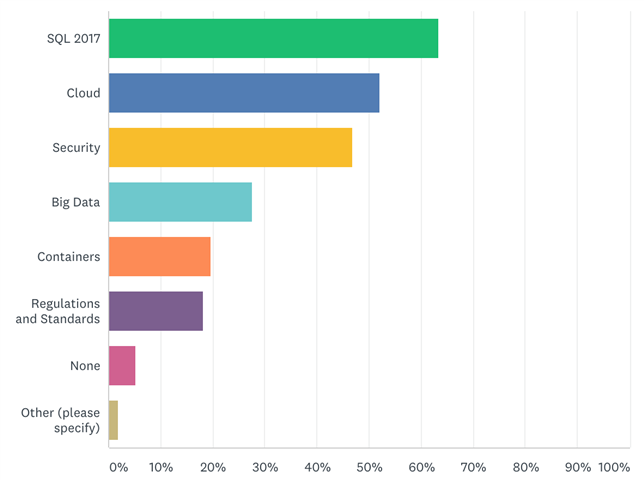Our product management team at IDERA recently polled a sample of our customer base and asked them to tell us what is the most important technology they want to learn about in 2018. This question is interesting because what DBAs most want to learn about is frequently an indicator of which projects they think will be coming up. Or, maybe they want to learn for career advancement reasons. Let's look at the data and I will share my thoughts on the matter.
The results (407 respondents) –>
Which of the following technologies are most important for you to learn about in 2018? (Select all that apply)

Observations, in no particular order:
Cloud isn't as easy as Microsoft and Amazon make it out to be. One thing this reminds us is that there are still a lot of database workloads that have not moved to the cloud. But of more interest to me is that DBAs know it's not a matter of if, but when they will put more into the cloud. The cloud providers have delivered many valuable improvements that make it much easier to migrate these workloads, but it's not fire and forget. Cloud databases (especially database as a service such as Azure SQL Database) bring a new set of challenges that change query analysis techniques, introduce entirely new configuration and setup choices that can make or break your applications, and so on. So in 2018 DBAs want to learn more about cloud.
2018 is the year of 2017? SQL Server 2017 rolled out last year to significant media fanfare thanks to big news like the arrival of SQL Server for Linux. Yet DBA teams haven't exactly jumped on the bandwagon so far. Judging from these numbers, this year should see a lot more teams using SQL Server 2017. My experience tells me it's not so much for items like Linux, but other highly popular features such as improved automatic tuning capabilities and improvements to the security model. If you have a specific feature you are counting on, sound off in the comments below.
Data security is not easy. DBA teams have been coming up with strategies to secure their SQL Server databases for years, so what's new here? The issue is everytime we think this problem is solved and we know how to do it, another breach makes the headlines. As more and more companies depend on data for the core of their business, this will only grow and importance. And, as the surface areas and attack vectors for databases change as they move to the cloud and to new systems like Linux and containers, the need to learn more will continue to rise.
SQL DBAs are NoSQL DBAs too. While we don't see so many teams with a DBA that manages both SQL Server and Oracle (for example), this data tells us that SQL Server DBAs are managing NoSQL databases as well. Of course, there are certain NoSQL technologies such as Hadoop that integrate very nicely with the newer versions of SQL Server. And since NoSQL growth is so high, many of these DBAs likely see this as a career advancement opportunity.
GDPR and other regulations aren't as important as they should be. Personally, I am disappointed to see this skillset as low as this shows us. With the full force of GDPR bearing down on us in just two short months, too many DBAs, especially those in the US, don't know how important it is to understand these regulations. These teams will be hit with surprises when they realize that any data pertaining to EU individuals stored in their databases must adhere to these new standards. It's possible that many DBA teams leave these audit practices to other teams, but I promise you that the impact to the DBAs will be felt if there are issues! Here's to hoping that more DBAs than this become educated on such regulations in 2018.
How many of these are important to your team and your career? Do you agree with the rankings? If not, how would you change things? I'd love to hear from you.